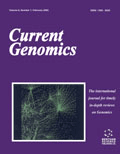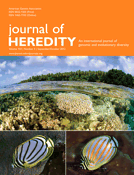
GENETICA
Scope & Guideline
Advancing the Frontiers of Genetic Research
Introduction
Aims and Scopes
- Genetic Diversity and Population Structure:
Research on genetic diversity and population structure in various organisms, often utilizing genomic tools and molecular markers to assess genetic variability and its implications for conservation and evolutionary studies. - Comparative Genomics and Phylogenetics:
Studies that involve comparative genomic analyses to understand evolutionary relationships among species, as well as phylogenetic studies that trace lineage divergence and adaptations. - Gene Expression and Functional Genomics:
Investigations into gene expression patterns in response to environmental stresses or developmental processes, focusing on functional genomics to elucidate gene roles in various organisms. - Molecular Evolution and Systematics:
Research that explores molecular evolution, including the evolution of gene families and the genetic basis of traits, often contributing to systematics and taxonomy. - Applications in Agriculture and Conservation:
Studies that apply genetic insights to improve agricultural traits in crops and livestock, as well as research aimed at conservation genetics to protect endangered species.
Trending and Emerging
- Genomic Adaptation to Environmental Change:
There is an increasing focus on how organisms adapt at the genomic level to changing environmental conditions, emphasizing the role of genetic diversity in resilience against climate change. - Integration of Omics Technologies:
The application of multi-omics approaches (genomics, transcriptomics, proteomics) is trending, allowing for a more holistic understanding of biological processes and interactions within organisms. - Conservation Genomics:
Research dedicated to conservation genomics is gaining momentum as genetic tools are used to inform conservation strategies and manage genetic diversity in endangered species. - Functional Genomics in Agriculture:
Emerging studies are increasingly applying functional genomics to improve crop and livestock traits, targeting genetic modifications that enhance stress resistance and productivity. - Phylogenomics and Evolutionary Biology:
Phylogenomics is gaining traction as researchers utilize genomic data to resolve complex evolutionary relationships and understand the mechanisms of speciation and adaptation.
Declining or Waning
- Traditional Mendelian Genetics:
Research focusing solely on classical Mendelian genetics has seen a decline, as modern genetic studies increasingly integrate molecular and genomic approaches that provide a more comprehensive understanding of genetic traits. - Microsatellite Analysis:
While microsatellite markers were once a staple for genetic studies, their use has waned in favor of more powerful genomic techniques such as SNP (Single Nucleotide Polymorphism) analysis and whole-genome sequencing. - Cytogenetics of Model Organisms:
Cytogenetic studies in well-established model organisms have become less frequent, possibly due to the expanded focus on non-model organisms and ecological genetics, reflecting a shift towards exploring genetic diversity in less-studied species.
Similar Journals

MAMMALIAN GENOME
Advancing the frontiers of mammalian genetics.MAMMALIAN GENOME is a leading journal in the field of genetics, aimed at advancing our understanding of the genetic makeup and evolutionary relationships of mammals. Published by Springer, this journal has been a cornerstone resource since its inception in 1991, converging extensive research up to 2024. With a commendable Q2 classification in the 2023 Genetics category and a Scopus Rank of #208 out of 347, it serves as a vital platform for sharing cutting-edge findings, methodologies, and reviews pertaining to mammalian genomes. Although not an open-access journal, MAMMALIAN GENOME ensures that its content is accessible through institutional subscriptions, catering to a global audience of researchers, professionals, and students. Its commitment to excellence in genetic research positions it as an essential publication for anyone striving to contribute to this dynamic field.

GENETICS AND MOLECULAR BIOLOGY
Empowering researchers to shape the future of biology.GENETICS AND MOLECULAR BIOLOGY, published by the SOC BRASIL GENETICA, is a prominent journal dedicated to the advancement of knowledge in the fields of genetics and molecular biology. Since its inception in 1998, this Open Access journal has served as a vital platform for researchers, professionals, and students to disseminate their findings and engage with the latest innovations and discoveries. With an impact factor that reflects its growing influence, GENETICS AND MOLECULAR BIOLOGY ranks in the Q3 category for both genetics and molecular biology as of 2023, indicating its position within the academic community. The journal is indexed in Scopus, highlighting its commitment to maintaining rigorous peer-review standards while providing wide-reaching access to quality research. Operating out of Ribeirão Preto, Brazil, it fosters a collaborative environment for academic discourse and research development not only in Brazil but also globally. The journal encourages submissions that explore a wide range of topics in genetics and molecular biology, making it an essential resource for anyone involved in these dynamic fields.

CURRENT GENOMICS
Empowering researchers with cutting-edge genomic insights.CURRENT GENOMICS is a premier journal published by Bentham Science Publishers that focuses on the expansive field of genomics, including both clinical and molecular genetics. With the ISSN 1389-2029 and E-ISSN 1875-5488, this esteemed journal has been disseminating significant scientific insights since its inception in 2000 and continues to contribute to the field through 2024. Based in the United Arab Emirates, CURRENT GENOMICS boasts a Q3 ranking in both the genetics and clinical genetics categories for 2023, reflecting its growing impact in the scientific community. Although not an open-access journal, it provides valuable content that supports researchers and professionals in navigating the complexities of genetic research and its applications. By publishing original research articles, reviews, and case studies, CURRENT GENOMICS aims to foster a deeper understanding of genomic science and its implications for medicine, thus playing a critical role in the advancement of genetics and biomedical research.

Evolutionary Bioinformatics
Fostering collaboration for groundbreaking evolutionary insights.Evolutionary Bioinformatics, published by SAGE Publications Ltd, is a pioneering open-access journal established in 2005, dedicated to advancing the field of evolutionary biology through innovative computational techniques and bioinformatics. With an ISSN of 1176-9343, it serves as a critical platform for researchers, professionals, and students to disseminate impactful findings and foster collaboration across disciplines. The journal spans a broad scope, contributing significantly to the areas of Ecology, Evolution, Behavior and Systematics, and Genetics, as evidenced by its respectable Scopus rankings and quartile placements in 2023. With a commitment to providing comprehensive, peer-reviewed research articles and tools for sharing knowledge, Evolutionary Bioinformatics plays an essential role in shaping the future of evolutionary studies and bioinformatics. Readers and contributors alike are encouraged to engage with cutting-edge research that pushes the boundaries of understanding in this dynamic field.

Conservation Genetics Resources
Unlocking the Secrets of Conservation GeneticsConservation Genetics Resources, published by SPRINGER in Germany, is a key resource in the field of conservation science, focusing on the genetic aspects essential for biodiversity preservation and ecosystem management. With an ISSN of 1877-7252 and an E-ISSN of 1877-7260, this journal has established its presence as a vital platform for disseminating high-quality research that addresses the challenges of genetic conservation strategies. Notably, it has demonstrated a strong academic impact, currently holding a Q3 ranking in Ecology, Evolution, Behavior and Systematics and Q4 in Genetics for 2023, alongside Scopus ranks that position it as a notable contributor in its fields. This journal invites contributions that enhance the understanding of genetic diversity, population genetics, and conservation genomics, and it serves as an essential reference for researchers, professionals, and students committed to the preservation of our natural heritage. The access options are varied, catering to the needs of its diverse readership, and making it an indispensable addition to academic research spaces.

GENES & GENETIC SYSTEMS
Connecting Researchers Through Open Access KnowledgeGENES & GENETIC SYSTEMS, an esteemed journal published by the Genetics Society of Japan, serves as a vital platform for the dissemination of innovative research within the fields of genetics, molecular biology, and medicine. Established in 1996 and based in Mishima, Shizuoka, Japan, this journal has actively contributed to the academic community, fostering collaboration and knowledge sharing among researchers and professionals. The journal’s impact can be seen through its category quartiles, which reflect its position in Genetics, Molecular Biology, and Medicine, and while it currently ranks in Q4 in Genetics and Q3 in Medicine (miscellaneous), it is poised for growth as it continues to publish pivotal studies. With a commitment to open access, GENES & GENETIC SYSTEMS ensures that research findings are freely accessible to the global scientific community, promoting a more inclusive approach to knowledge distribution. This journal is essential for students, researchers, and professionals seeking to stay informed of advancements in genetic research and its implications for the broader field of medicine.

JOURNAL OF HEREDITY
Shaping the Future of Genetics ResearchJOURNAL OF HEREDITY is a prominent academic journal published by Oxford University Press Inc, dedicated to the interdisciplinary field of heredity and genetics. With a rich history dating back to 1905 and an anticipated coverage until 2024, this journal has established itself as an essential resource for researchers, professionals, and students alike. It boasts a significant impact as evidenced by its prestigious rankings in various categories, achieving a Q1 status in Biotechnology and notable placements in Genetics and Molecular Biology. The journal fosters open dialogue on contemporary issues and advancements within the field, emphasizing both foundational research and applied studies. Access to its rich content is structured through traditional subscription models, allowing for comprehensive literature engagement. By publishing high-quality research, JOURNAL OF HEREDITY plays a crucial role in shaping the future of genetics and promoting collaboration across scientific disciplines.

NATURE REVIEWS GENETICS
Bridging Basic Science and Clinical Genetics.NATURE REVIEWS GENETICS, published by NATURE PORTFOLIO, stands as a leading journal in the field of genetics, boasting a remarkable reputation reflected in its Q1 ranking across multiple categories including Genetics, Clinical Genetics, and Molecular Biology. With an impressive percentile of 99th in both Genetics and Clinical Genetics, as well as a solid rank in Molecular Biology, this journal is pivotal for researchers, professionals, and students alike who seek to stay informed on the latest advancements and comprehensive reviews in genetic research. The journal's scope encompasses a wide array of topics, providing in-depth insights from fundamental genetic principles to clinical applications, underscoring its importance in bridging basic science and medical practice. Though not an open-access publication, it remains accessible through various academic institutions, enhancing its reach and influence within the scientific community. With publication years spanning from 2000 to 2024, NATURE REVIEWS GENETICS continues to shape the future of genetics research and education.

Genetics Research
Unlocking the Secrets of Genetic InnovationGenetics Research, published by HINDAWI LTD, is a distinguished open access journal that has been at the forefront of genetic studies since its inception in 1960. With the transition to open access in 2019, this journal has expanded its accessibility, fostering knowledge dissemination across the global scientific community. Operating out of the United Kingdom, it provides a platform for innovative research in the fields of genetics and molecular biology, encompassing a broad range of topics that are highly relevant to medical sciences. As of 2023, it holds a Q4 classification in Genetics and a Q3 classification in miscellaneous Medicine, reflecting its ongoing commitment to scholarly excellence amidst shifting academic landscapes. While the journal's H-index remains unlisted, its indexed ranking within Scopus, with a rank of #325/328 in the Genetics category highlights the challenges ligated to its niche audience. Nevertheless, it serves as a crucial resource for researchers, professionals, and students eager to contribute to and stay informed on the latest genetic research trends and breakthroughs.

CURRENT GENETICS
Elevating Genetic Research to New HeightsCURRENT GENETICS is a prestigious journal published by SPRINGER, dedicated to advancing the field of genetics through the dissemination of high-quality research. With a notable impact factor and ranking in the Q2 category for both Genetics and Medicine (miscellaneous) as of 2023, it firmly establishes itself as a significant resource for the academic community. The journal’s comprehensive scope explores the latest findings in genetic research, along with accompanying interdisciplinary studies, providing a platform for researchers to share innovative ideas and methodologies. ISSN: 0172-8083, E-ISSN: 1432-0983, stands testament to its commitment to scholarly excellence. While Open Access options are not currently available, CURRENT GENETICS remains accessible to a broad audience, promoting a rich exchange of knowledge that supports the vast and evolving discipline of genetics. Since its inception in 1979 and through its converged years till 2024, this journal has played a crucial role in confronting scientific challenges and promoting advancements in genomic medicine and molecular biology. As such, it is an essential read for researchers, professionals, and students keen to remain at the forefront of genetic research.